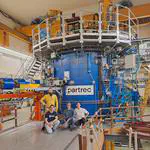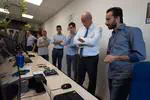Latest News
Prof. Federico Reghenzani and Ph.D. candidates Davide Baroffio, Emilio Corigliano, and Tomas Antonio Lopez carried out a series of experiments at the PARTREC particle accelerator in Groningen (Netherlands).
The team’s research focuses on evaluating the effectiveness of software-based mitigation techniques against radiation-induced transient faults. These techniques, implemented in ASPIS, aim at protecting low-cost Commercial Off-The-Shelf (COTS) components for their operation in radiation-prone environments, such as space applications. PARTREC cyclotron accelerator allowed to reproduce the effects of protons to test the effectiveness of the implemented techniques in a more realistic environment.
Federico Reghenzani, post-doc at HEAP Lab, proposed the three-year research project “Mixed-Criticality Fault-Tolerant Systems for the Future Generation of Spacecraft Computers”, which has been selected by the Open Space Innovation Platform (OSIP) programme of the European Space Agency (ESA). The project, co-funded by ESA and DEIB’s HEAP Lab, will be developed by Federico under the supervision of Prof. William Fornaciari.
The SafeCOP EU project review meeting was held at the Clarion Hotel in Trondheim, Norway, near the premises of consortium partners Maritime Robotics and SINTEF.
During the first day, the consortium presented the final outcome of the six use cases, including a live demonstration of the Maritime Robotics autonomous vessels. During the second day, the technical management team presented the main conclusions and scientific findings to the reviewers and project officer.








